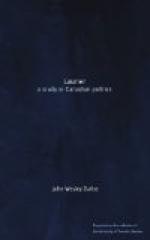make over the party organization in the province.
Open rebellion under Francois Langelier broke out
in December: “A coalition with Chapleau,”
Langelier informed the public, “is under way.”
But the rebellion died away. The Laurier influence
was too strong. Langelier was quite right in
his statement. The coalition movement at that
time was far advanced. The letter from Chapleau
to Laurier, bearing date February 21, 1897, quoted
by Professor Skelton, was that of one political intimate
to another. Take this paragraph as an illustration:
“The Castors in the battle of June 23rd lost
their head and their tail; their teeth and claws are
worn down; even breath is failing for their cries
and their movements and I hope that before the date
of the Queen’s jubilee we shall be able to say
that this race of rodents is extinct and figures only
in catalogues of extinct species.” The
reference to the coming extinction of the Castors
had relation to the then pending provincial elections
as to which he made certain references to political
strokes which “I am preparing.” Associated
with this Laurier-Tarte-Chapleau triumvirate was a
fourth, C. A. Dansereau, nominally postmaster of Montreal,
actually the most restless political intriguer in
the province of Quebec. Dansereau had been the
brains of the old Senecal-Chapleau combination which
had dominated Quebec in the eighties. Just what
Laurier thought of the company he was now keeping
was a matter of record for he had set it forth in
a famous article in L’Electeur in 1882 entitled
“The Den of Thieves,” which led to L.
A. Senecal, the Bleu “boss,” prosecuting
him for criminal libel. Laurier stood his trial
in Montreal, pleaded justification, and after a hard
fought battle won a virtual triumph through a disagreement
of the jury with ten of the jurymen favorable to acquittal.
LAST ROUND WITH THE BISHOPS
Little wonder that Francois Langelier, his brother
Charles, and other associates of Laurier in the lean
years of proscription were consumed with indignation
that Laurier should pass them by to associate with
his former enemies. They did not realize the
political necessity that controlled Laurier’s
course. Laurier had great need to hold his new
allies for his position in Quebec for the first year
or so of office was precarious. The Manitoba school
question had still to be settled. Laurier was
political realist enough to know that he would have
to take what he could get and this he would have to
dress up and present to the public as his own child.
He knew that the bishops, chagrined, humiliated, enraged
by their election experience, were only waiting for
the announcement of settlement to open war on him.
It would then depend upon whether or not they were
more successful than in June in commanding the support
of their people. In Laurier’s own words:
“They will not pardon us for their check of
last summer; they want revenge at all costs.”




